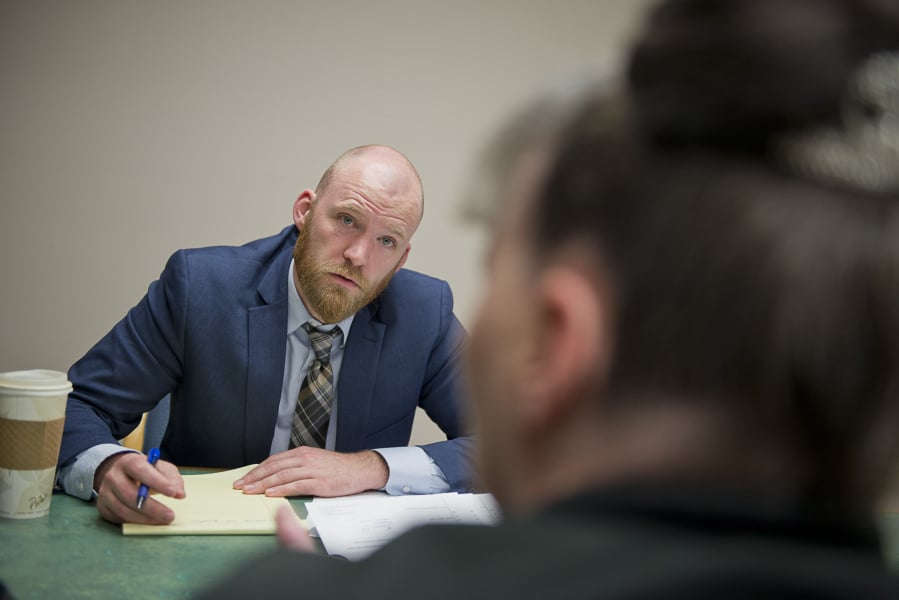Debra Lepak was still wearing her work clothes when she attended a Clark County Volunteer Lawyers Program clinic in April.
A percentage of her wages were being garnished from every paycheck to pay more than $3,000 in medical bills. She lives month-to-month, so the small cuts to her income were proving to be a big challenge.
Vancouver attorney Eli Marchbanks guided Lepak through the court process, jotting notes on a yellow legal pad as she asked questions about how to recover the money. She had filed a motion arguing she was improperly served by a collections company, which prompted a review of the case. Marchbanks told her that making the company work was the best move; time is money, and the court’s default judgment was not legitimate, he said.
“I’m glad I came in and I’m glad you’re here to help,” Lepak said. “When I got the answer from those guys, it was great.”
Need help?
To contact the volunteer lawyers: https://ccvlp.org or 360-695-5313
By the numbers
Clients served by the Clark County Volunteer Lawyer Program in the past 12 months, need identified in Clark County’s Community Needs Assessment, and projected assistance based on staff capacity in 2019.
Debt defense and bankruptcy: Served, 140; need, 224; projected, 210
Legal financial obligations: Served, 43; need, 134; projected, 86
Criminal record vacations: Served, 3; need, 108; projected, 54
Marchbanks is among 98 attorneys volunteering their time to help clients who can’t afford to hire a lawyer for debt-related court matters. He spends three hours each month helping people at the clinic in the program’s offices, located in the basement of an old building on Main Street in downtown Vancouver.
“People generally understand the gist of their legal defense. What’s impossible for them, and understandably, are the court procedures. I think that’s the chief problem,” Marchbanks said.
Helping clients with debt is a sliver of the aid the volunteer lawyers program offers. They also help with family law and housing, immigration matters, and visit schools to advise young parents. These are some of the ways the program assisted 1,300 people last year, said program director Ashley Eklund. (Eklund has moved on to a new job since reporting on this story began).
Debt defense
The program was founded in 1990 and provides aid to low-income members of the community. Its creation was prompted by the reality that despite constitutional law guaranteeing legal representation for people who can’t afford it, the promise often falls short, especially in civil cases.
There are three major pieces tied to the program’s debt-related continuum: Homeless Court, which the volunteers program refers to as financial forgiveness, because it no longer applies solely to unhoused people; debt defense, which revolves around wage garnishment and improving credit; and the somewhat new third piece, criminal records vacation.
Since 2004, Clark County District Court has held various versions of financial forgiveness hearings. People with unresolved fines from minor offenses can request a payment review by a judge, and have fines pulled from collections and reassessed to more accurately reflect their ability to pay.
Small fines pile up for people below the poverty line. Take a speeding ticket, for example. There’s the cost of the citation itself, a filing fee and additional court charges. The total price tag is often hundreds of dollars, said Eklund.
“And if you end up missing a court date, which unfortunately happens for people who can’t miss a day of work, then the court imposes more fines,” she said. “If you’re living on a fixed income and trying to keep a roof over your head, catching up can seem impossible.”
Seventy percent of low-income families face at least one civil legal concern each year, according to the 2015 Washington State Civil Legal Needs Study Update. Of those facing at least one problem, the number of issues actually experienced concurrently is more than nine, the study says.
Many of those families don’t get the help they need, mainly due to lack of access.
In 2018, the Clark County Volunteer Lawyers Program helped 43 clients reassess their fines. All clients whose fines went before a Homeless Court judge were pulled from collections, sometimes removing tens of thousands of dollars.
On average, these clients had nearly 70 percent of what they owed waived, totaling about $104,000 in 284 cases. (Most clients have five to 10 independent cases needing reassessment).
The program projects 134 clients will need assistance with financial forgiveness procedures this year. It thinks it can offer help to about 86 of them.
New laws
Volunteer attorneys and the program are pushing those numbers up with increased visibility and connections to community partners, but the increase can partly be attributed to new laws restricting steep fees against the poor.
A 2015 Washington Supreme Court ruling, State v. Blazina, made it so when defendants are sentenced in criminal court, the judge is required to find they have the ability to pay before imposing certain costs.
“That was a major step, because it made the court a little bit more cautious,” said Tim Murphy, an attorney with the Northwest Justice Project. “There were still certain costs deemed mandatory that the court was using and still charging people, and then a new law passed in June 2018.”
Murphy said House Bill 1783 allows most fines and fees to be waived for indigent defendants. The law also makes it possible for people to return to court if they become impoverished and request the money be waived, adjusted or replaced with alternatives like community service.
Murphy said he helps keep judges in check about following the laws by appealing the amount of fines to a higher court, but the route is a last-ditch effort. More regularly, Murphy, Eklund and Clark County Volunteer Lawyers Program Executive Director Elizabeth Fitzgearld meet with district court judges and other Homeless Court stakeholders to implement changes and address issues.
“District Court is open to feedback. They’ve been collaborative with us to make sure they’re doing it right. And we’re trying to keep that dialogue going, because laws change, or there may be something we failed to look at,” Murphy said.
Criminal records vacation
In December, the program announced it received a $24,000 grant from the Community Foundation for Southwest Washington to implement its Fresh Start Program.
The volunteer attorneys with the program help on civil matters like Homeless Court, but it’s become apparent that may not be enough. Many clients are seeing reductions in debt and clearing court fines, but barriers to housing and employment persist due to criminal records.
“Most of the clients assisted by (the program) with unpaid court fines live unhoused or in temporary housing. Because of their unpaid fines though, they are 1) not eligible to have their record expunged, regardless of the age of the crime, and 2) if their fines are in collections, they have poor credit and are without a driver’s license by court order,” Fitzgearld said in promoting Fresh Start.
Once a client’s court debt is removed, attorneys can address their criminal record as part of Fresh Start. The program has done this with a few clients. In making the option available, the demand is clear.
As of January 2019, three clients had sought help in having their criminal records vacated. The program estimates about 108 people need the same help, and they can provide it to about 54.
Marchbanks has had a hand in some of the initial cases. He said the most common charges people hope to get removed from their records include misdemeanor assault, malicious mischief and shoplifting charges.
“This is a very real issue for a lot of people,” Marchbanks said. “There have been people I’ve met who need to get this done for legitimate reasons. Maybe they’re involved in a custody action, or it’s affecting their ability to get employment or housing.”
The process for having those lesser charges vacated is straightforward, Marchbanks said. Once certain criteria are met, anyone can fill out a packet on the Washington Courts website. The harder part is understanding how to get in front of a judge, he said.
Medical debt
Marchbanks said the same issues apply to people seeking to get rid of medical debt.
He coaches clients on putting together the correct information, such as income documents, and finding forms needed by hospitals to apply to medical debt programs. Nonprofit hospitals — like those run by Clark County’s two largest providers, Legacy Health and PeaceHealth — are required to participate in the debt programs to keep their tax-exempt status.
The volunteer lawyers program has helped people filing for bankruptcy for more than a decade. Last year, it took a closer look at the kinds of debt clients were facing and found many people were struggling with medical bills. People also had debt that could be negotiated or defended against before the court issues a judgment.
Debt Defense, another initiative in its preliminary stages being implemented by the program, lets clients fight against such money woes and preserve or improve credit. A total of 140 people sought out such help in 2018. The volunteer attorneys think they can help about 210 clients with these issues this year — 14 shy of the projected need.
After visiting Marchbanks at one of the program’s clinics, Lepak was prepared to go to court and argue for herself the issues laid out in her motion. They’d gone over them in less than an hour.
She ended up not having to go.
The collection company reviewed her case and agreed that the judgment was improperly obtained. The collector did not object Lepak’s argument, so a judge signed an order voiding the judgment saying she owed thousands of dollars.
That means the collection company will have to refund all the money they garnished from Lepak.




